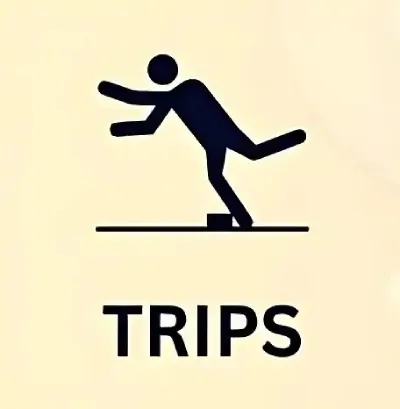What is a Trip?
Understanding Trip in the Workplace
A trip happens when your foot strikes, catches, or collides with an obstruction in your path, causing you to lose balance. Unlike slips — which are caused by low friction between footwear and the ground — trips are usually the result of sudden interruptions in movement.
For a frontline security officer, trips can occur anywhere: in an office building with uneven carpets, on a warehouse floor scattered with packaging, or outside in a poorly lit car park. Because security work involves constant patrols and quick responses, the risk of tripping is significantly higher than in many other professions.

Why Trips Matter in Security Work
Trips might sound minor, but in security work, even a simple stumble can have serious consequences:
Operational delays: If you’re responding to an alarm or incident, tripping slows you down — leaving the site vulnerable.
Injury risk: A fall forward can result in sprains, fractures, or head injuries, sometimes requiring weeks off duty.
Responsibility for others: If you’re escorting visitors, vulnerable people, or even detaining a suspect, a trip could put them — and you — in danger.
Professional image: Falling in public spaces undermines confidence in your capability as an officer, even if the cause wasn’t your fault.
Did you know? The HSE reports that trips, slips, and falls combined cause over one-third of all major workplace injuries — making them the most common and costly category of workplace accidents in the UK.
Common Causes of Trips for Security Officers
Security officers encounter trip hazards daily because of the wide variety of environments they cover. Some common causes include:
Clutter and debris: Packaging, tools, or deliveries left in walkways. For example, a late-night delivery leaves boxes stacked in a corridor you patrol.
Uneven flooring: Loose carpet tiles, cracked pavements, potholes, or raised thresholds.
Trailing cables: CCTV wires, cleaning equipment leads, or temporary power extensions left across walkways.
Poor housekeeping: Bags, umbrellas, or mop buckets left in reception or stairwells.
Low visibility: Poor lighting in stairwells, shadowy car parks, or power cuts making hazards harder to see.
Weather effects: Ice, snow, mud, or fallen leaves tracked into entrances or building lobbies.
Fatigue: Long shifts reduce alertness, making hazards more likely to be overlooked.
The Science Behind a Trip
Trips are about momentum and interruption. Here’s how it works:
As you walk, your body weight is moving forward.
If your foot suddenly strikes an object (like a cable, uneven step, or misplaced item), your forward motion continues while your foot is stopped.
Unless you regain balance instantly, the momentum pushes you forward — often resulting in a fall.
This is why speed increases risk. Running to a call or rushing through patrol routes gives you less time to spot hazards and less chance to recover balance if you do trip.
Real-World Scenario
Imagine you’re patrolling a shopping centre during closing hours. In your rush to respond to a reported disturbance, you run through a corridor where a contractor has left a toolbox on the floor. You don’t spot it in time and trip.
Personal: You twist your ankle and can’t complete your shift.
Operational: The disturbance is left unchecked for longer, raising risks to property and people.
Company: The client questions why patrol routes weren’t checked and why the hazard was missed.
Industry: Another reported accident involving a security officer adds to the perception of poor safety standards in the sector.
Practical Tips to Prevent Trips
Clear as you go: If you see clutter, remove it or cordon it off — don’t wait for someone else.
Control your speed: Stay alert, even when responding quickly. Running blindly is never professional.
Light the way: Always carry a torch and report poor lighting.
Check your kit: Ensure footwear is in good condition, with proper tread. Avoid loose straps or dangling equipment that could snag.
Work with others: Remind contractors and cleaners to use warning signs and keep pathways clear.
Report hazards properly: Use incident logs and radio communication to alert colleagues straight away.
Consequences of Ignoring Trip Hazards
Personal consequences: Sprains, fractures, head injuries, long-term absence, reduced earning potential.
Company consequences: Investigations, legal claims, higher insurance premiums, contract loss.
Industry consequences: Accidents undermine trust in security officers, portraying them as careless.
Moral consequences: Ignoring hazards puts the public and colleagues at unnecessary risk.
Teamwork and Communication
Preventing trips isn’t a solo task — it’s a shared responsibility across the whole team:
Use radios: Communicate hazards clearly and quickly.
Support contractors: Ensure cleaners, delivery staff, and visitors are following safety rules.
Set the example: When colleagues see you act on hazards, they are more likely to do the same.
Safety culture spreads through action — when you take hazards seriously, others follow.
Stay Sharp, Stay Standing
Trips are not harmless stumbles — they are one of the leading causes of workplace accidents in the UK. For security officers, every hazard is a chance to prove vigilance, professionalism, and responsibility. By taking action quickly, you keep yourself safe, protect your employer, and strengthen trust in the entire security profession.

